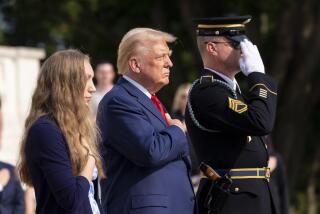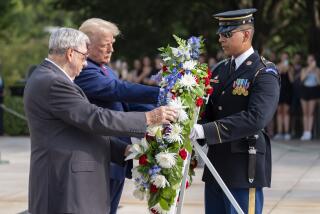Reagan Says Cemetery Visit Is âMorally Rightâ : Asserts Bitburg Rites Will Dramatize âGreat Reconciliationâ With Germans, Not Honor Dead
WASHINGTON â President Reagan, on the eve of his 10-day trip to Europe, said Monday that it is âmorally rightâ for him to visit a German military cemetery at Bitburg Sunday and emphasized that his purpose will not be âto honorâ soldiers buried there.
Outlining the expected theme of a politically sensitive address he will deliver, Reagan told European television interviewers that he wants to make Americans and Germans aware of their âgreat reconciliationâ since World War II and to pledge once more that ânever again must there be anything like a Holocaust.â
As for the 1,887 German soldiers buried there--most of them teen-age draftees and 49 of them Waffen SS combat troops--the President declared: âAll of those in that cemetery have long since met the supreme judge of right and wrong, and whatever punishment or justice was needed has been rendered by one who is above us all.â
Televised to Europe
The Presidentâs remarks, televised live to much of Europe, were his most extensive so far on the controversy that has overshadowed preparations for the rest of his trip, including the annual economic summit conference of seven industrial democracies later this week in Bonn.
Reagan emphatically declared that he will not back away from his commitment to West German Chancellor Helmut Kohl to accompany Kohl to the cemetery, regardless of heavy pressure from Jewish organizations, Holocaust survivors, American veterans and many influential congressmen.
âThe final word has been spoken as far as Iâm concerned,â the President said. âI think it is morally right to do what I am doing. And Iâm not going to change my mind about that.â
A White House spokesman said Reagan also has decided to go ahead with plans to participate with Kohl in a wreath-laying ceremony at the cemetery. Last week, White House Chief of Staff Donald T. Regan disclosed that presidential aides were conferring with West German officials in an effort to change the ceremony.
Vice President George Bush, meanwhile, appealed to the nation to rally behind Reagan in what he said âhas been a very difficult time for everyone, and especially so for the President.â
Preceding Reagan to the podium of a U.S. Chamber of Commerce convention, Bush promised that the President, while in West Germany, âwill make clear to the world that he understands the lessons of history, that he knows we can never let time blur over memories.â
And in a reminder that relations with a loyal ally are at stake, Bush urged his audience to âkeep in mind also the demands upon him as the leader of the Free World and the alliance that has kept the peace for 40 years.â
Reagan, in his European television interview, said he and Kohl both agree that this is âno longer, after 40 years, a time when we should be out shooting off fireworks and celebrating a victory or commiserating a defeat. This is a time to recognize that after years and years--centuries, indeed--of wars being settled in such a way that they planted the seeds of the next war . . . the miracle has happened that has brought 40 years of peace and 40 years of alliance.â
Reagan then continued that âwhat Iâve said to some of my friendsâ about the German soldiers buried at Bitburg--a total of roughly 3,000 from World Wars I and II--is that they âhave long since met the supreme judge of right and wrong.â
Of the presence of the 49 graves of members of the Waffen SS--the combat arm of Hitlerâs elite guard, a separate branch of which ran the Nazi death camps--the President said his visit to the cemetery âisnât . . . to honor anyone. Itâs going there simply, in that surrounding, to more visibly bring to the people an awareness of the great reconciliation that has taken place and, as Iâve said before--too many times, I guess--the need to remember . . . of being pledged to never let it happen again.â
Reagan complained that the U.S. news media have not âbeen quite fair about this. I think they have gotten ahold of something, and like a dog worrying a bone, theyâre going to keep on chewing on it. . . .â
However, the President told the European journalists, âI donât believe it actually has affected a majority of the people here.â
More to Read
Get the L.A. Times Politics newsletter
Deeply reported insights into legislation, politics and policy from Sacramento, Washington and beyond. In your inbox three times per week.
You may occasionally receive promotional content from the Los Angeles Times.











